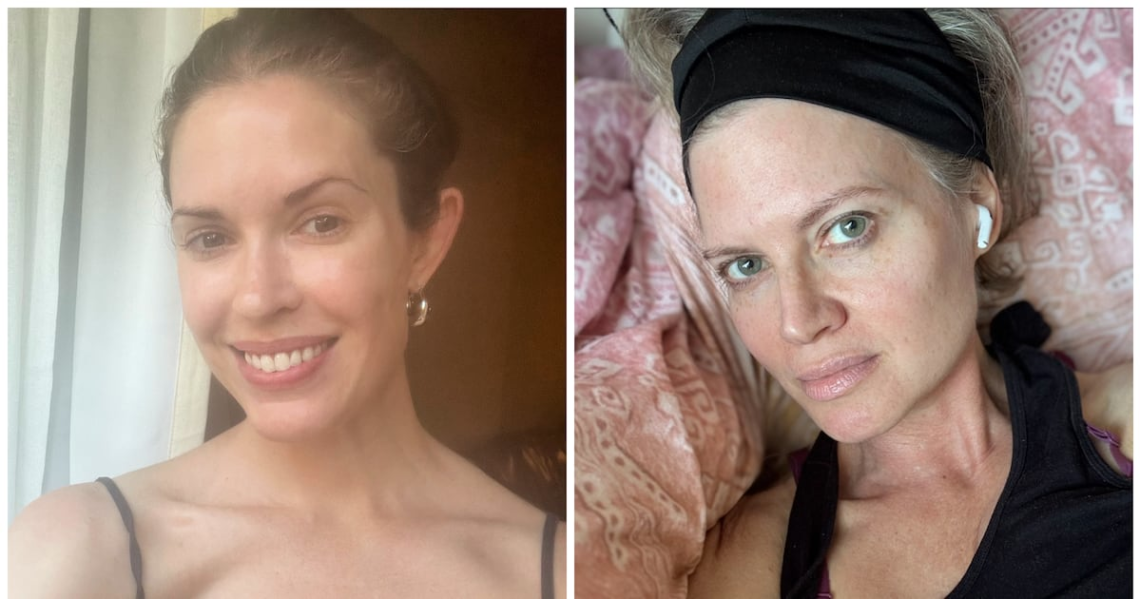Perhaps you sometimes forget to wash your face. I’m the last person to judge anyone for a memory lapse on lathering up. We’ve all done it, especially after a long night. Washing your face with cleanser is considered a necessity by many—but not everyone.
As a regular cleanser user, I was curious to understand what could lead someone to cease this seemingly fundamental step. I spoke with people who swear that relying on a simple, water-only rinse is their secret to a glowing complexion. But what are the potential risks and rewards of going cleanser-free? And why do some people swear by skipping cleanser and switching to a rinse-only routine?
Arguments in favor of the standard face-wash routine
Zoë Indigo, a board-certified dermatologist based in Beverly Hills, told the Daily Beast that cleansing one’s face is an essential step in maintaining healthy, balanced skin. Skipping it can have noticeable consequences over time. “When you don’t wash your face, dirt, excess oil, dead skin cells, and environmental pollutants stay trapped on the surface,” said Dr. Indigo. “This buildup can clog pores, trigger breakouts, worsen dryness, and even accelerate premature aging.”
Patricia Oyetakin, a board-certified dermatologist based in Georgia, is a staunch believer in this routine step. “I believe washing your face daily is non-negotiable,” she told the Daily Beast. “I highly encourage my patients to cleanse their faces twice daily.”
Cleansing becomes especially important for makeup fans. Leaving cosmetics on overnight traps debris against the skin, which Dr. Indigo said can lead to irritation, inflammation, and a dull-looking complexion. Even the most lightweight makeup, warns Dr. Oyetakin, can “reduce the water content of the skin and increase the risk of irritation.”
Your environment also plays a role. “If you live in a polluted city, such as Los Angeles, skipping your nightly cleanse allows microscopic particles from the air to linger on your skin,” said Dr. Indigo, explaining that these “pollutants generate free radicals, unstable molecules that damage collagen, trigger dark spots, and contribute to premature aging.”
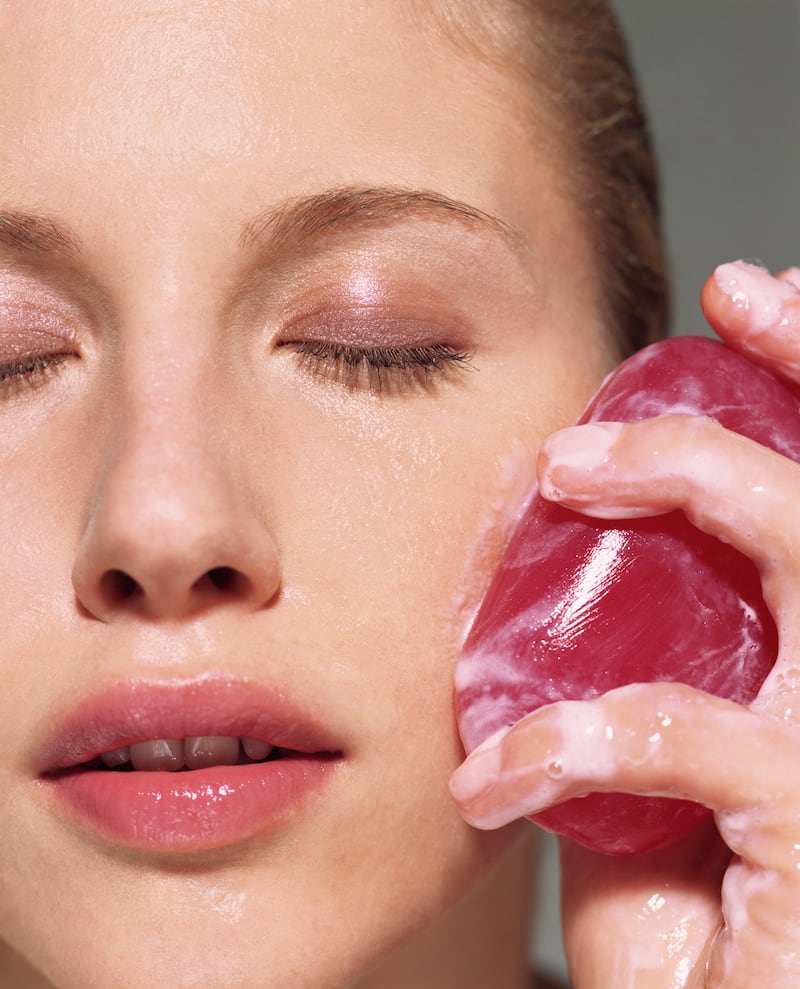
As for cadence, Indigo believes that most people benefit from washing their face twice daily: once in the morning to remove overnight buildup, and again at night, to rid their skin of the day’s dirt, oils, and environmental toxins before bed.
When I did a quick poll of my friends and followers, I found myself in good company with others who admit to occasional lapses on lathering up their faces at night. “There have definitely been more nights that I’ve gone to sleep without washing my face than there have been ones where I did…I can’t say I love the results, though, because I have oily skin,” Chicago-based author and journalist L’Oreal Thompson Payton, 37, told me. “There have been days when I’ve forgotten to wash my face, and that feels gross.”
When can lowering your face-wash frequency be beneficial?
A twice-daily regimen isn’t a must for everyone. “If your skin is dehydrated, sensitive, or prone to irritation, a single nightly cleanse may be enough—especially if you don’t wear makeup,” Dr. Indigo said. However, she stipulated that exercising or wearing heavy makeup can bump up their cleansing needs. “The key is balance: cleansing often enough to keep your skin fresh and healthy, but not so frequently that you strip away its natural protective oils.”
For those with dermalogical conditions—such as eczema, rosacea, acne, and the like—over-washing can “strip the skin and cause dryness,” while skipping cleanser altogether can worsen flare-ups, Dr. Indigo told me. “Finding the right cadence, usually once or twice a day depending on your lifestyle, helps [patients] maintain healthy, glowing skin.”
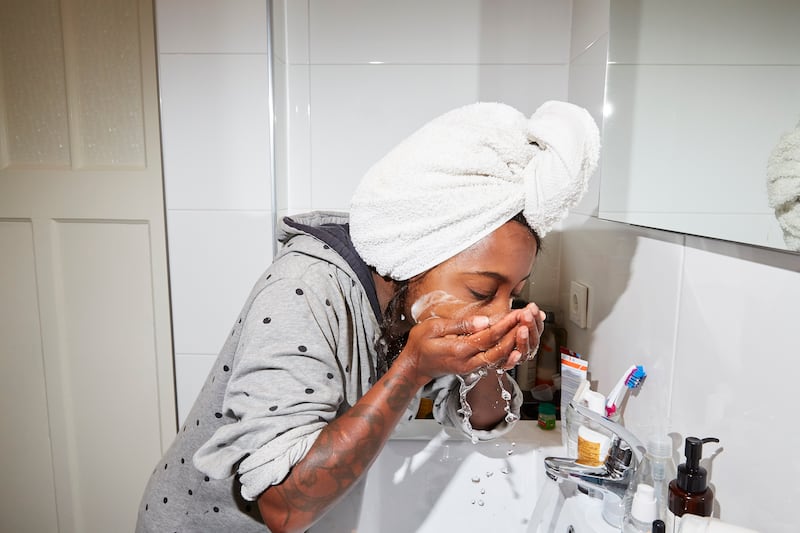
Why some people swear by a cleanser-free routine
There are plenty of proponents of lather-free routines, who say their avoidance of cleanser actually delivered fabulous results. (Notably, though, all report regularly rinsing their skin in the sink and shower.)
Take Randi Newton, a 47-year-old interventionist and case manager in Manhattan, New York. Newton told me she avoids cleansers and moisturizers due to past product-related breakouts. Her minimalist skincare routine includes splashing water on her face, plus the occasional use of acne pads. Every few months, she receives Botox injections to address fine lines and wrinkles.
Newton attributes her radiant, blemish-free complexion to a combination of genetics and lifestyle choices, including drinking a gallon of water daily and avoiding alcohol for 16 years. She also hardly wears makeup. “I don’t really have a skincare routine,” she told the Daily Beast. “I don’t really wash my face. Instead, I’ll splash water on it, and I also don’t use moisturizer often and sunscreen at all.”
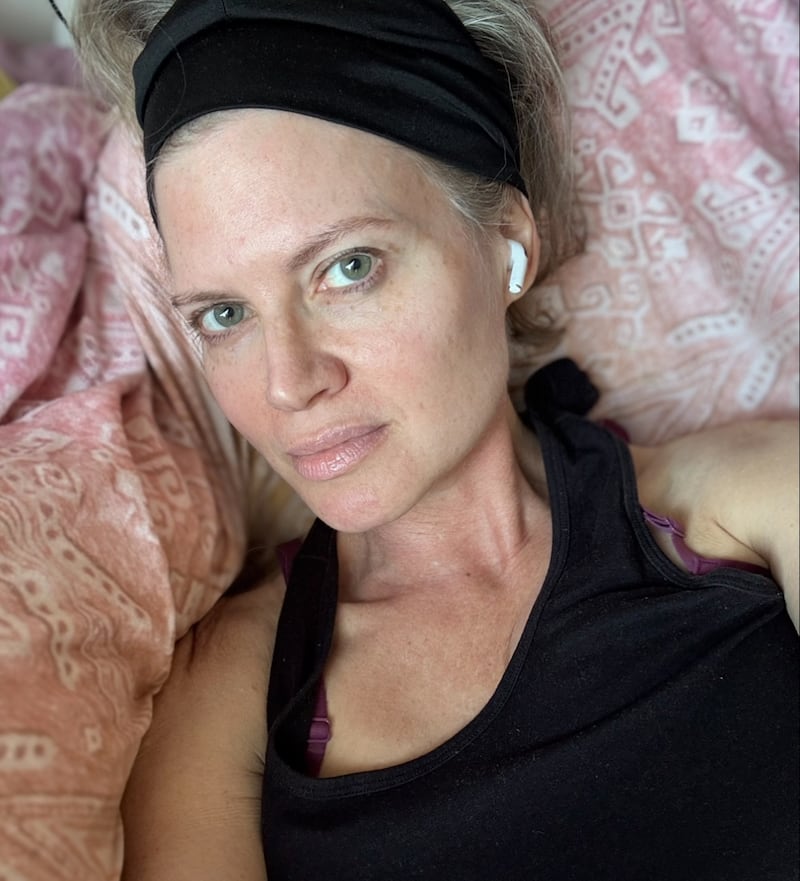
Six years ago, Newton attempted a more robust skincare routine, but it caused her cystic acne to flare up because she had not found the right combination of products. She tried facials instead, but the sessions would only clog her pores. In 2023, she decided to switch things up by occasionally washing her face or not at all, and her skin couldn’t thank her more for her decision. Newton, like many of us, thought an intricate skin care routine was key to achieving perfect, blemish-free skin, but from her experience, doing less often got her better results. “I thought, ‘Okay, I have to do a skincare routine to preserve my youthful looks.’ When I started breaking out, everything changed,” she said.
So far, it’s been two years since she washed her face with cleanser, and she’s loving the results. What works for her is keeping it simple. “I get up, maybe splash water on my face. I do it before I go to bed. It’s that simple. I moisturize maybe two or three times a week. I guess less is more, in my case, everyone’s different,” Newton told me.
Newton isn’t alone in her pared-down approach. Alexandra Engel, a 34-year-old senior director of lifestyle editorial and branded content from Brooklyn, New York, significantly reduced her skincare routine after having a baby eight months ago.
After she stopped wearing makeup and gradually phased out daily face washing, Engel noticed positive changes. Now, she only uses cleanser on special occasions—mainly after wearing makeup—and sticks to gentle formulas. She still uses moisturizers and serums daily, but avoids harsh products to manage her rosacea. “I really pared down my routine,” she told me. “I gradually stopped washing my face, except for rinsing it in the shower.”
Until recently, Engel always washed her face before going to sleep and each morning after getting up. It was an inherent part of her routine—until recently. Now, she says, there are “mornings when I wake up and just need to splash my face with water,” and even some days when she wakes up, doesn’t do anything at all, and feels “great.”
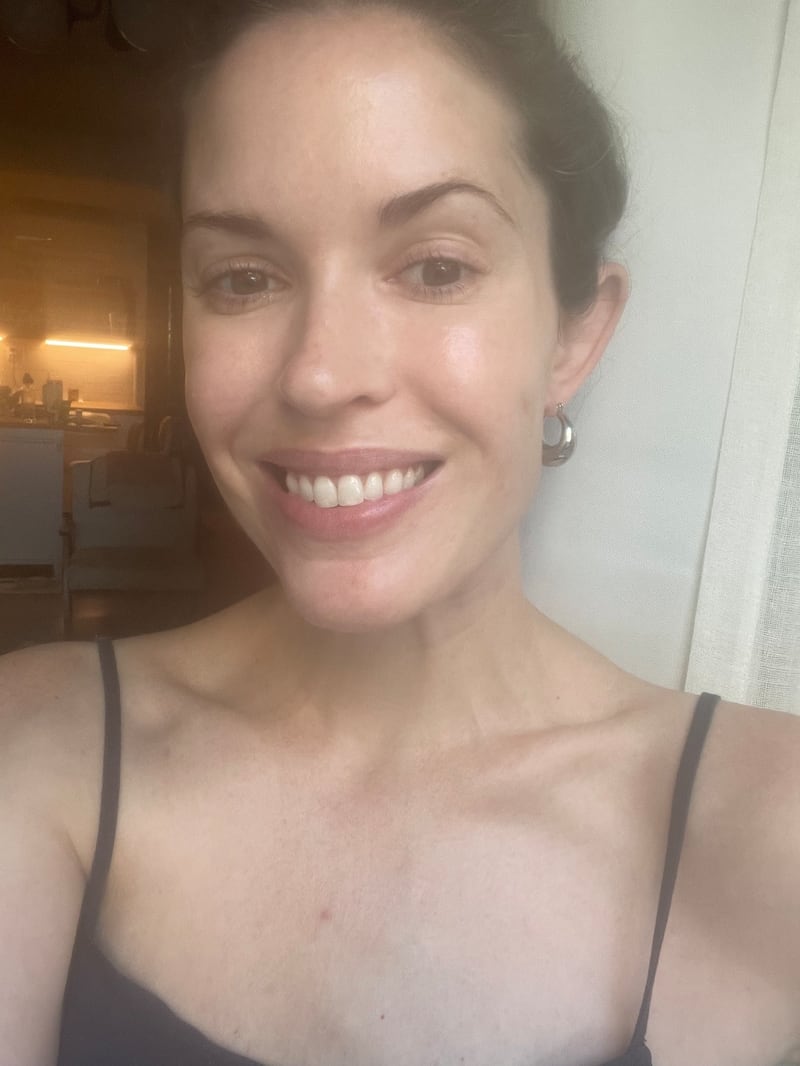
Engel’s minimal skincare routine proved effective for her naturally sensitive skin. “I felt like my face was responding well [and that] it was giving my skin a much-needed break during a time in my life when everything else was quite busy and chaotic,” she recalled. “Not washing my face is one less thing to do and care about.”
Engel believes that we have the autonomy to curate a skincare routine that works well for the different seasons in our lives. “As you get older and he goes through various phases of life, what used to work when you were younger just doesn’t cut it,” she said.
So, why might the absence of a cleanser-inclusive ritual work in some folks’ favor? Dr. Indigo noted that there can be situations where “skipping a face wash may help, for example, if you have dehydrated, sensitive, or eczema-prone skin and want to preserve your natural barrier oils.”
What are the potential risks if you stop all forms of cleansing?
Depending on your skin type, environment, and lifestyle, the decision to go totally cleanse- and rinse-free can come with consequences, said Dr. Indigo.
Your skin naturally produces oil, known as sebum. When you don’t cleanse or rinse sebum off the surface of your skin, it mixes with sweat, pollution, and dead skin cells, which can lead to clogged pores, breakouts, and changes in texture. Over time, this buildup can also trigger inflammation and dullness. While unpleasant, these are only the initial repercussions on the menu.
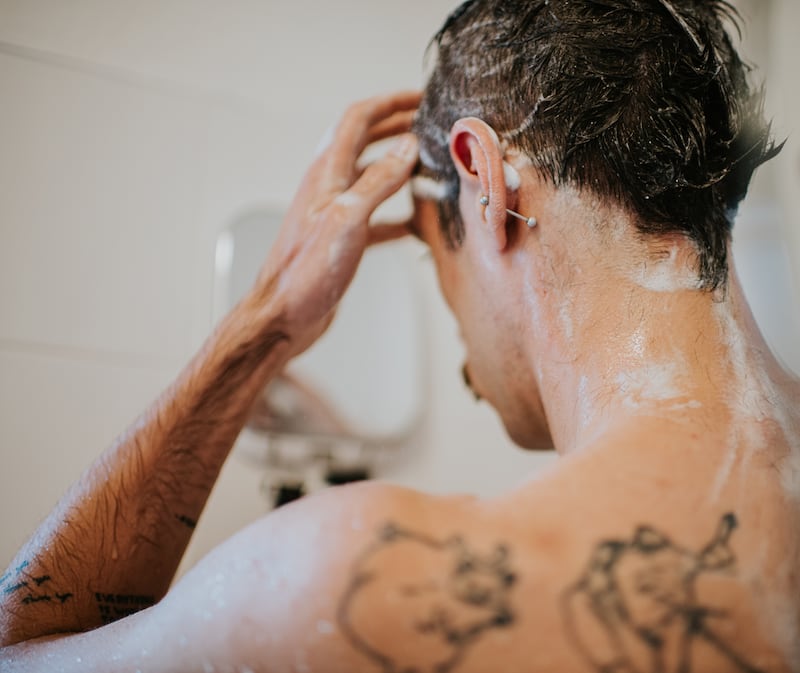
Some conditions can develop specifically from not cleansing, like dermatitis neglecta. Dermatitis neglecta can develop when the skin isn’t cleansed for an extended period, typically over several weeks or months. This leads to brownish, scaly, or thickened patches caused by the buildup of sweat, oil, and debris, Dr. Indigo told me. In some cases, people may also develop folliculitis, where the hair follicles become infected, resulting in tiny red bumps and pustules.
Seborrheic dermatitis
Excess oil and buildup on the skin can fuel the growth of yeast, which naturally lives on our skin but can become unbalanced without proper cleansing. This can lead to seborrheic dermatitis, characterized by redness, flaking, and greasy patches, particularly around the sides of the nose, eyebrows, hairline, and chin. This condition typically develops after several weeks of not cleansing, and can occur more quickly in humid or polluted environments.
Perioral dermatitis
For some people, the prolonged buildup of products, oils, and bacteria around the mouth, nose, and chin can trigger perioral dermatitis. This condition typically presents as tiny red bumps, mild scaling, and irritation, and tends to develop after approximately one to two months of not properly cleansing.
Itching and irritation
The buildup of sweat and bacteria can lead to itching and irritation within a few days to a week. This can result in hyperpigmentation, when chronic inflammation leads to dark spots, which can occur within weeks or months, especially in skin of color. Texture, too, can be affected, leading to scaliness and rough skin. This is usually noticeable within two to four weeks as the dead skin cells accumulate.
The post I Quit Using Cleanser and My Skin Looks Better Than Ever appeared first on The Daily Beast.
